[vc_row][vc_column][vc_column_text]
The JSW Group is exploring investment options in liquefied natural gas (LNG), according to two investment bankers.
The Sajjan Jindal-promoted group, also the country’s largest steel maker, plans a foray into a regasification terminal, where imported natural gas can be received in the form of LNG.
Many companies and investment entities are showing interest in the LNG segment. The predominant player is Petronet LNG (PLL), a joint sector company of GAIL and other government-controlled oil marketing companies.
Tata Realty and Infrastructure, Adani Group and Shapoorji Pallonji are some of the others which have either expressed interest or are in various stages of an LNG terminal project. “LNG is seen as a fuel of the future and we expect its demand in India to double in the next four years, with expansion of the regasification and pipeline infrastructure in the eastern and southern part of the country,” said Debasish Mishra, partner at Deloitte Touche Tohmatsu India.
The JSW group’s entry is likely to be through its JSW Infrastructure subsidiary. “The company has been and continues to look for opportunities to invest, acquire or tie-up in the LNG terminal business. Such businesses are technical in nature and tie-ups with skilled players will help,” said one of the two bankers earlier referred to. An e-mail query to JSW was not answered.
H Energy, subsidiary of the Hirananandani Group, is also executing an LNG terminal project at JSW Infrastructure’s Jaigarh port in Maharashtra. According to data from CRISIL Rating Research, import of LNG is likely to increase 11 per cent in 2016-2017, if it continues to grow at the same rate shown in the first nine months of the current financial year. At 25.01 billion cubic meters, this would be the highest since 2006-2007.
This growth, however, is not in sync with the petroleum ministry’s thrust on reducing energy import. “LNG being a relatively cleaner fuel and with its price advantage over some substitutes (diesel, petrol), its demand will grow for the medium to long term. Hence the interest from various players in developing LNG terminals,” said Saurabh Kamdar, director at CRISIL Infrastructure Advisory.
With the Union government reducing customs duty on LNG to 2.5 per cent from the earlier five per cent, LNG use in industry and city gas distribution is likely to get impetus. Annual import saving from this would be ~900 crore at the current level, suggest government officials. The import duty on LNG for power plants is already nil.
The LNG terminal segment, bankers add, is also seeing a good amount of interest from private equity (PE) entities, for its infrastructure nature and assurance of steady income once procurement agreements are signed for the facility.
However, key to this growing interest from both companies and PE would be ground execution. “Development of new terminals, apart from the ground execution aspect requires long-term source and sale tie-ups. With crude oil prices remaining volatile, sale contracts are a challenging part. Of the operational LNG terminals, evacuation issues for some have dragged down utilisation levels,” said Kamdar.
Of the four LNG terminals in the country, PLL’s Dahej and Shell’s Hazira are operating at more than 80 per cent utilisation levels. Dabhol’s was at 40 per cent and Kochi at five per cent, as of last October.
[/vc_column_text][/vc_column][/vc_row]






